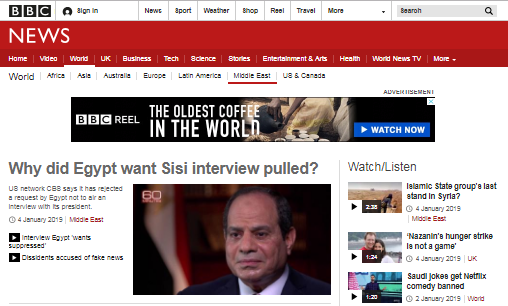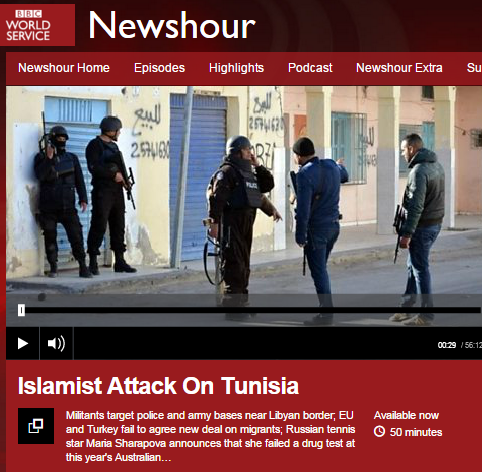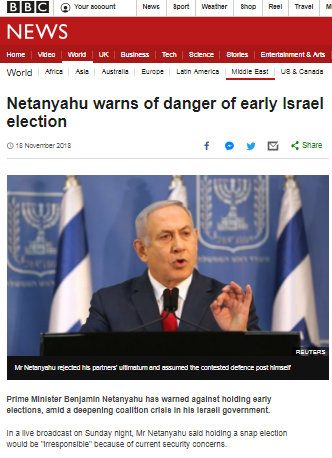As we saw in part one of this post the lead item in the November 13th afternoon edition of the BBC World Service radio programme ‘Newshour‘ was presented with the false equivalence promoting title “Deadly Fire Traded Between Israel and Gaza“.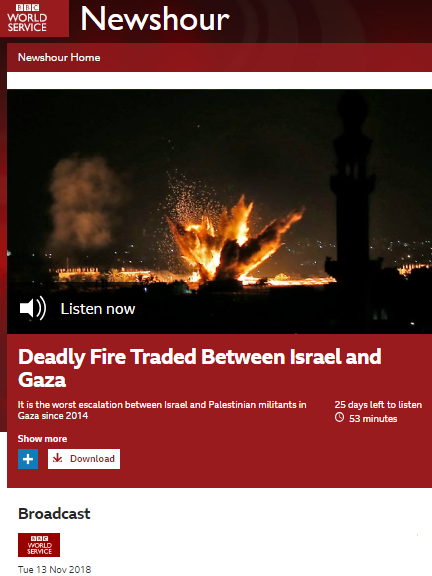
Having interviewed a resident of the Gaza Strip, presenter Julian Marshall went on to introduce his second contributor. Whereas in the introduction to the first interview Marshall had stated that “Israeli airstrikes have left at least six Palestinians dead”, in this introduction he failed to mention who was carrying out the attacks which resulted in a civilian casualty on the Israeli side of the border.
[emphasis in italics in the original, emphasis in bold added]
Marshall: “And sirens in southern Israeli towns and the port city of Ashkelon have been sending people rushing for shelters to escape rocket attacks from Gaza. In Ashkelon a rocket gutted an apartment building, killing a resident. Sigal Arieli also lives there. How has it been over the past 48 hours?
Arieli: “So last night until one o’clock a.m. it was crazy. We had two rounds of rockets – tens of rockets each time. And then we had a few hours of quiet over the night. And this morning we woke up with another two sessions of ten, or something like that, rockets over two different sessions at 6 a.m. and half an hour later. Since then Ashkelon has been quiet.”
Marshall: “And did you and others spend the night in shelters overnight?”
Arieli: “Well me personally I don’t have a shelter in my house so every time there’s a siren we run and hide under the stairs People that have shelters room [safe room] in their houses spent the night in the shelters. We just had to run every time that there was a siren. We ran quite a lot.”
Marshall then came up with the following question:
Marshall: “And did these…ehm…rockets…ehm…make contact with Ashkelon?”
Having told listeners in the introduction that a rocket had “gutted an apartment building”, he obviously already knew the answer to that bizarrely worded question. Listeners did not however hear of the direct hits on homes and businesses in additional locations.
Arieli: “What do you mean ‘made contact’? Did they land in Ashkelon?”
Marshall: “Yeah: did these rockets…did any of these rockets land in Ashkelon?”
Arieli: “Yes of course. We have Iron Dome system – this is a battery of rockets protecting us from rockets. But this time because there was so many rockets at the same time, every time, about eight different rockets landed in Ashkelon on buildings, in apartments, in open areas but definitely landed and some of them destroyed houses.”
Marshall’s line of questioning then took on an even more strange direction.
Marshall: “How long have you lived in Ashkelon, Sigal?”
Arieli: “Twenty-nine years actually.”
Marshall: “And have you ever considered moving because of the rocket threat?”
Arieli: “No way. This is home and we’re strong and we’re here. And when we have no rockets Ashkelon is a beautiful city, very peaceful, very green and by the water. There’s no way. We’re here. This is home.”
Listeners next heard Marshall recycling Hamas propaganda.
Marshall: “Because you may or may not be aware that the latest violence is also being accompanied by an exchange of threats between Israel and Hamas using Twitter and Hamas’ armed wing has tweeted in Hebrew warning Israelis to stay away from Ashkelon.”
Arieli: “OK, I’m not aware of that. I know Hamas is trying many ways to weaken the resilience of the people in Israel and especially here in Ashkelon but we only listen to IDF Homefront Command and we try to stay safe and just, you know, do what we were told: stay near sheltered area and just hopefully things will go back to normal soon.”
Marshall: “Why is Ashkelon targeted? Hamas says it’s because Israel is using it as a base for airstrikes.”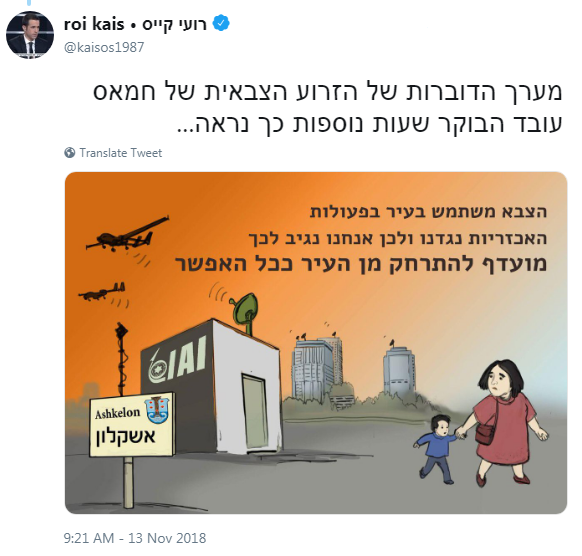
Marshall was citing an image put out by Hamas that morning in which it claimed that “The army uses the city in cruel actions against us and so we will respond to that. It is preferable to keep as far away from the city as possible”.
By repeating that baseless propaganda put out by a terrorist organisation, Marshall further muddied audience understanding of the basic story: the fact that Hamas and other terror organisations launched attacks against Israeli civilians in southern Israel while Israel’s response struck exclusively military targets after advance warnings were given.
Arieli: “Mmm…I don’t think so. First of all Ashkelon is the largest city closest to Gaza on their north side so this is a big city – 150,000 people – and it’s easy to target and it’s relatively close. It’s even closer that Sderot and it’s much larger. So I guess this is why Ashkelon is the target and also we have electric company here, we have water desalination plant, so I guess this is also something that they might be interested in hurting.”
Although he had asked his previous interviewee “What do you think needs to happen for all this to stop?” and “what should other countries in the world be doing?”, Marshall had a rather more specific question for his Israeli contributor.
Marshall: “You…you say you listen to the IDF but I mean do you have any advice for the IDF and what do you think they should be doing at the moment?”
Arieli: “[laughs] I’m a very plain [ordinary] citizen in Israel. I trust the IDF to do everything they can to keep us safe and I know that nobody wants this escalation. Both sides don’t want this round to end in a war like 4 years ago so I know IDF is doing everything in a measurement and they try not to cause something that will evoke like a really serious war between the two sides.”
He then went on to ask her a question which – notably – he did not pose to his contributor from Gaza, once again promoting the false notion of equivalence – given that civilian residents of Gaza were not targeted by the IDF while civilians in southern Israel were deliberately targeted by Hamas and other Gaza terror factions.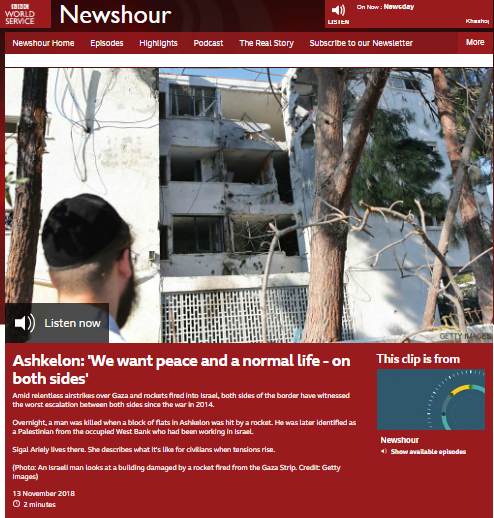
Marshall: “Sigal, you’ve been explaining to me the amount of stress and fear that there is among the residents of Ashkelon. Can you understand in any way how the residents – the civilian residents – of Gaza must be feeling something similar at the moment?”
Arieli: “”Of course. Being a civilian myself I can only think about the people on the other side, in Gaza, families, children. And I know that what we’re suffering is equal to what they’re suffering and I have all the compassion for everyone on the other side. It’s their leadership that is really doing all this cause and I know that the people – like the regular people that live in Gaza – like the regular people in Israel, we want peace, we want to live our life, raise our children in a normal environment. And I’m sure that everybody in Gaza that has children and is now fearing from IDF as much as we are worried about Hamas feels the same. The people we don’t want war. We want peace and normal life. That’s the bottom line that we need to understand. There are people on both sides.”
Having secured that messaging from his Israeli interviewee, Marshall closed the item there, leaving BBC World Service audiences with a deliberately distorted framing of this story which hinders their understanding by promoting false equivalence that does not in fact exist. Unsurprisingly, that messaging was also the focus of a separately promoted clip from the programme.
Related Articles:
More BBC false equivalence on World Service radio – part one
BBC WS ‘OS’ presents an inverted portrayal of Gaza rocket attacks
The BBC World Service’s idea of ‘context’ to rocket attacks on Israeli civilians
Terrorists and rockets disappear in BBC news reports
False equivalence in BBC News report on Gaza rocket attacks
BBC Radio 4: nothing to see in southern Israel, move along to Gaza

